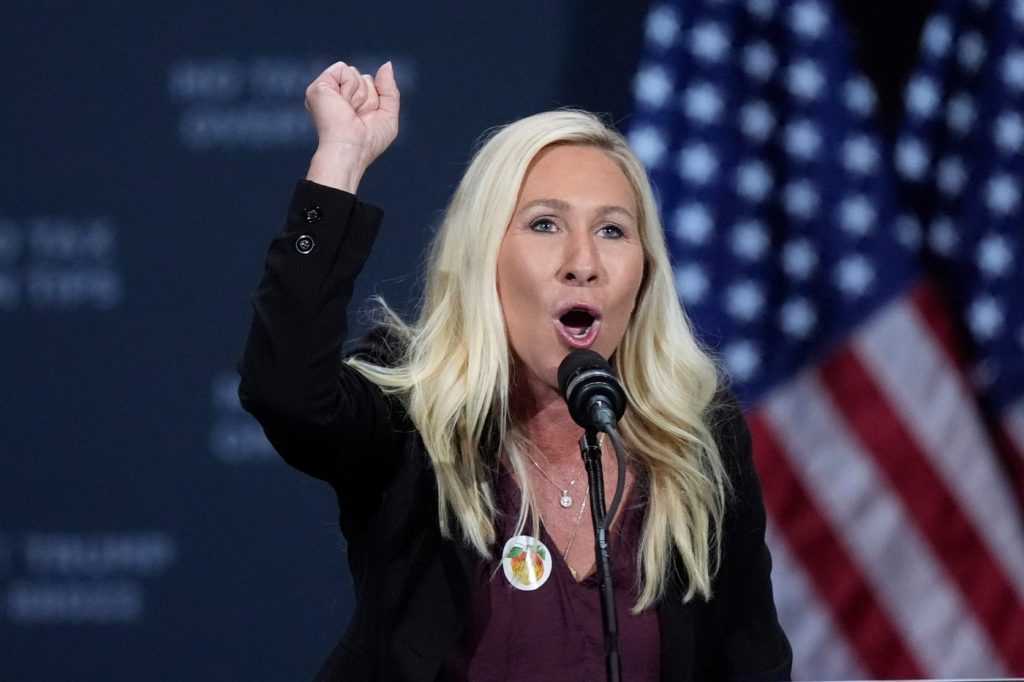ATLANTA (AP) — President Donald Trump’s unpredictable political landscape operates under a singular, enduring principle: there are no lasting friends or foes. This reality has been exemplified recently by Rep. Marjorie Taylor Greene, a Georgia lawmaker who announced her plans to leave Congress in January. Throughout his political journey, Trump has been known to clash with Republicans, many of whom have later reconciled with him, often assuming prominent roles in his administration.
On a Saturday, Trump referred to Greene as “a nice person” mere hours after labeling her a “traitor.” Greene, who has been a strong advocate for Trump and the “Make America Great Again” movement, has supported his baseless claims of a fraudulent 2020 election and mirrors his confrontational political style. This situates her in stark contrast to other mainstream Republicans who, after initially opposing Trump, found themselves capitulating to his influence within the Republican Party.
The rift between Greene and Trump did not emerge from differing ideologies or character judgments but rather from disagreements regarding the Jeffrey Epstein files and health care policies. As Greene plans her exit from Congress, she becomes one of the most significant MAGA figures to part ways with Trump, leaving uncertainties about the implications for both parties involved.
“I have fought harder than almost any other elected Republican to elect Donald Trump and Republicans to power,” Greene stated in a video announcing her departure. Kevin Bishop, a former aide to Senator Lindsey Graham, described the situation as “out of left field” and recognized that, despite Trump’s declining approval ratings, he continues to wield considerable influence over Republican Party activists and various factions.
Historically, Trump was not always the central figure in Republican power dynamics. During the 2016 presidential campaign, competitors criticized him harshly. For example, Graham branded him a “kook” and a “race-baiting, xenophobic, religious bigot.” However, over the years, such opponents, including Graham, transitioned into fervent supporters. Marco Rubio and J.D. Vance also underwent significant transformations in their perceptions of Trump. Initially critical of Trump's candidacy, they grew to embrace his policies and persona.
Republicans who chose to maintain their criticisms of Trump often faced political repercussions, while those who adjusted their stances typically found a pathway back to favor. Senator Bill Cassidy, one of the few to vote against Trump, also maneuvered to accommodate his political future by backing a controversial nominee during his reelection campaign.
Greene acknowledged these patterns, noting how many establishment Republicans express disdain for Trump yet are welcomed back into his fold after elections. Trump’s approach to politics has been described as “transactional,” operating more like a businessman than a traditional politician. He has shown a willingness to reconcile differences and foster relationships, often based on personal rapport rather than strict ideological alignment.
This week, Trump exemplified his unfettered connections by meeting with New York Mayor-elect Zohran Mamdani, a democratic socialist he previously misidentified as a communist. The meeting highlights Trump’s preference for forming alliances with successful individuals regardless of political differences. Bishop observed that the connections Trump forges often develop through shared experiences, such as time spent on the golf course.
Greene’s continued political journey remains uncertain. She possesses the financial independence indicated by her ethics disclosures and has a substantial following on social media with 1.6 million followers on X. Greene is also visible within conservative media and has hinted at aspirations for higher office, including the potential for a gubernatorial run in Georgia or a U.S. Senate bid against Democratic Senator Jon Ossoff.
However, Greene has also acknowledged the power Trump holds within her largely Republican constituency, suggesting her desire to avoid a contentious primary battle as a reason for her withdrawal. Trump stated, “Once I left her, she was gone because she would never have survived the primary,” while indicating a possible openness to repairing the relationship, implying that he is capable of mending differences with anyone, setting a tone of potential future reconciliation.











